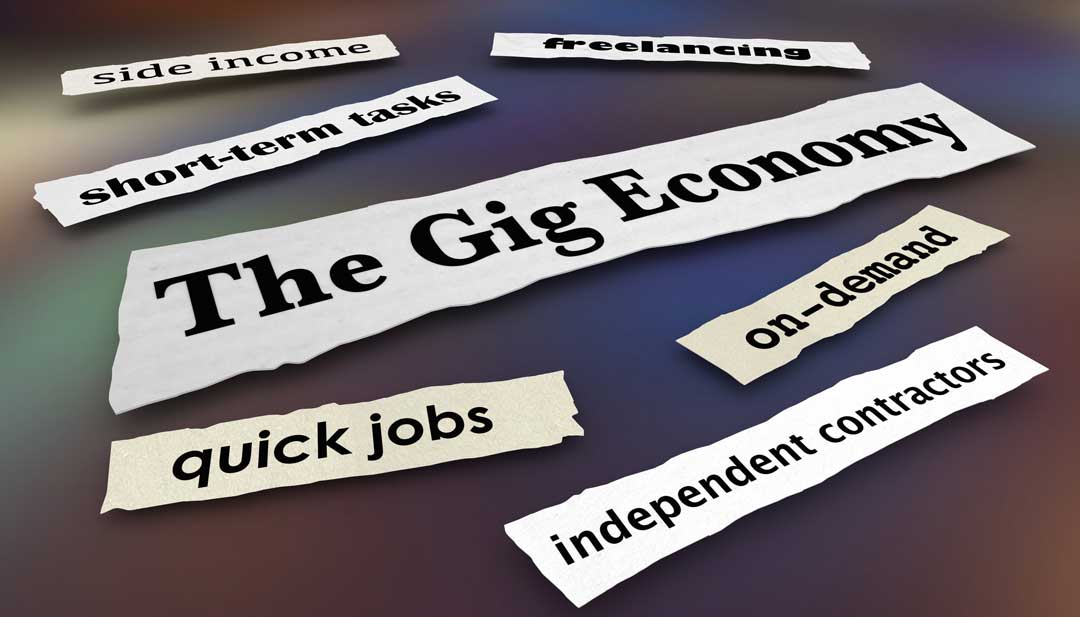
About hobbies and side hustles
You may think it is just a hobby, but CRA may disagree. CRA wants its fair share if you earn money through a little side hustle, business activity, or another extra gig. The agency believes many tax dollars in the past may have gone uncollected about hobbies and side hustles, and they aren’t happy about it.
How and where you make money is shifting, and CRA has been paying close attention to what is referred to as “platform economies.”
A platform economy brings buyers and sellers together through the internet or mobile apps. These sources are gaining traction and popularity and could be significant contributors to household income that has gone unreported.
Let’s break down the platform economies.
The Gig Economy
This one isn’t new, and many will tell you that the gig economy can make ends meet.
You provide service on a short-term basis, pick up a contract for a period of time, or go the freelance route. Companies hire independent contractors or freelancers in a gig economy, often through online platforms or apps. These workers are typically considered to be self-employed instead of employees. The money from the gig economy is considered to be income.
It is important to note that the gig economy is very different than the sharing economy, which is also under the spotlight of CRA.
The Sharing Economy
This is where money is earned from unused assets such as a room in a home or cottage or a vehicle. Think ridesharing, bike rentals, boats, machinery, or equipment.
Talking about hobbies and side hustles, if you use your personal assets to generate additional income by sharing them, CRA wants to know about it.
The Peer-To-Peer Economy
People will sell their goods or services from one person directly to another person. The second-hand economy is booming: think Posh Mark, Kijiji, eBay, or Etsy, to name a few.
Before you panic, CRA isn’t likely interested in last year’s Lululemon pants you decided to resell for a fraction of the cost. However, they are likely interested if you are a buyer snapping up deals and reselling for a profit.
Social Media Influencers
We all know someone making money off a social media platform through product placement, endorsement, or promotion. They become a brand ambassador and motivate others to buy a product or service. This, too, could be very lucrative via advertising revenue and is also very visible to CRA. It doesn’t take a lot of investigation to go online to determine who is doing what. If you are getting paid, CRA wants to know about it too. The audit will happen.
The Ball Is In Your Court
As the landscape has shifted, so too have the means to identify those who aren’t reporting income. CRA will go to great lengths to check out people on social media and try to connect the dots.
In other words, an endorsement for a big brand but little income reported warrants suspicion of tax evasion and an audit. Or, if you rent a room via Airbnb, it will show up, as CRA has proven its effectiveness at gaining access to anyone registered with any online platform.
Now it isn’t all bad news. You have to report all of the income generated, but you will also deduct all the expenses incurred to generate the income. So your crafting hobby is likely fine if it costs you more to make something than what you can sell it for.
About hobbies and side hustles, if you are uncertain and fear you may have crossed the line, reach out to CRA. Consider doing so via the Voluntary Disclosures Program. Voluntary only applies if you are unaware of CRA taking any compliance action against you. Be sure to include all the relevant information and income generated and the potential estimate of tax owing.
You know if you have been generating unreported income, so the ball is in your court. You might want to consider calling CRA before they come calling for you.
Source: CTVNews.ca
Newsletters
No Results Found
The page you requested could not be found. Try refining your search, or use the navigation above to locate the post.
Events & Sponsorship
No Results Found
The page you requested could not be found. Try refining your search, or use the navigation above to locate the post.
Articles & Publications
Reporting income from Airbnb
Reporting Income from Airbnb Like other, more traditional, rentals, the Canada Revenue Agency (CRA) has specific rules surrounding the declaring of rental income, which you should become familiar with as soon as possible. What you need to know about earning income...
What is Income Splitting?
What is Income Splitting? By definition, income splitting involves diverting dividend income (and certain other types of income) from one family member to another member in a lower tax bracket resulting in substantial tax savings. By way of example, let’s take the...
Real Estate Tax Update
Real Estate tax update Canada Revenue Agency (CRA) has taken substantial changes to control real estate transactions. In recent years, CRA has increased its real estate audits, particularly in the Greater Vancouver and the Greater Toronto areas, where increased real...
Snowbirds
Snowbirds, March 1, 2019 The age-old Canadian tradition for retirees: when it starts getting cold outside, Canadians will “flock” to the warmer shores of the United States. Are there any tax considerations in the United States we need to be aware of when your retired...
Beware of scammers posing as CRA employees
Beware of scammers posing as CRA employees. Scammers posing as Canada Revenue Agency (CRA) employees continue to contact Canadians, misleading them into paying the false debt. These persistent scammers have created fear among people who now automatically assume that...